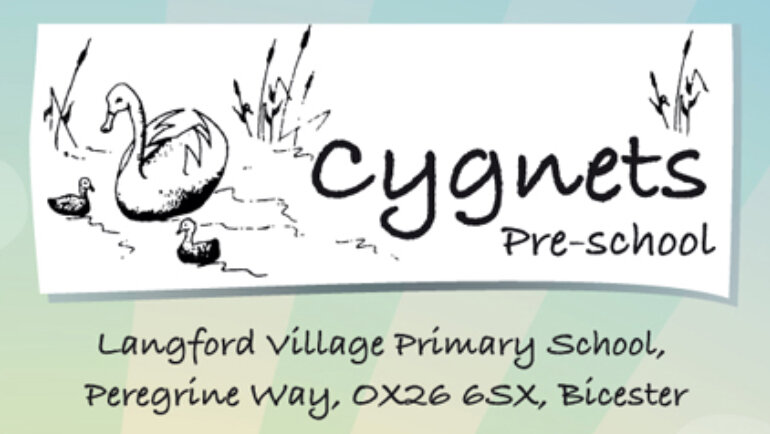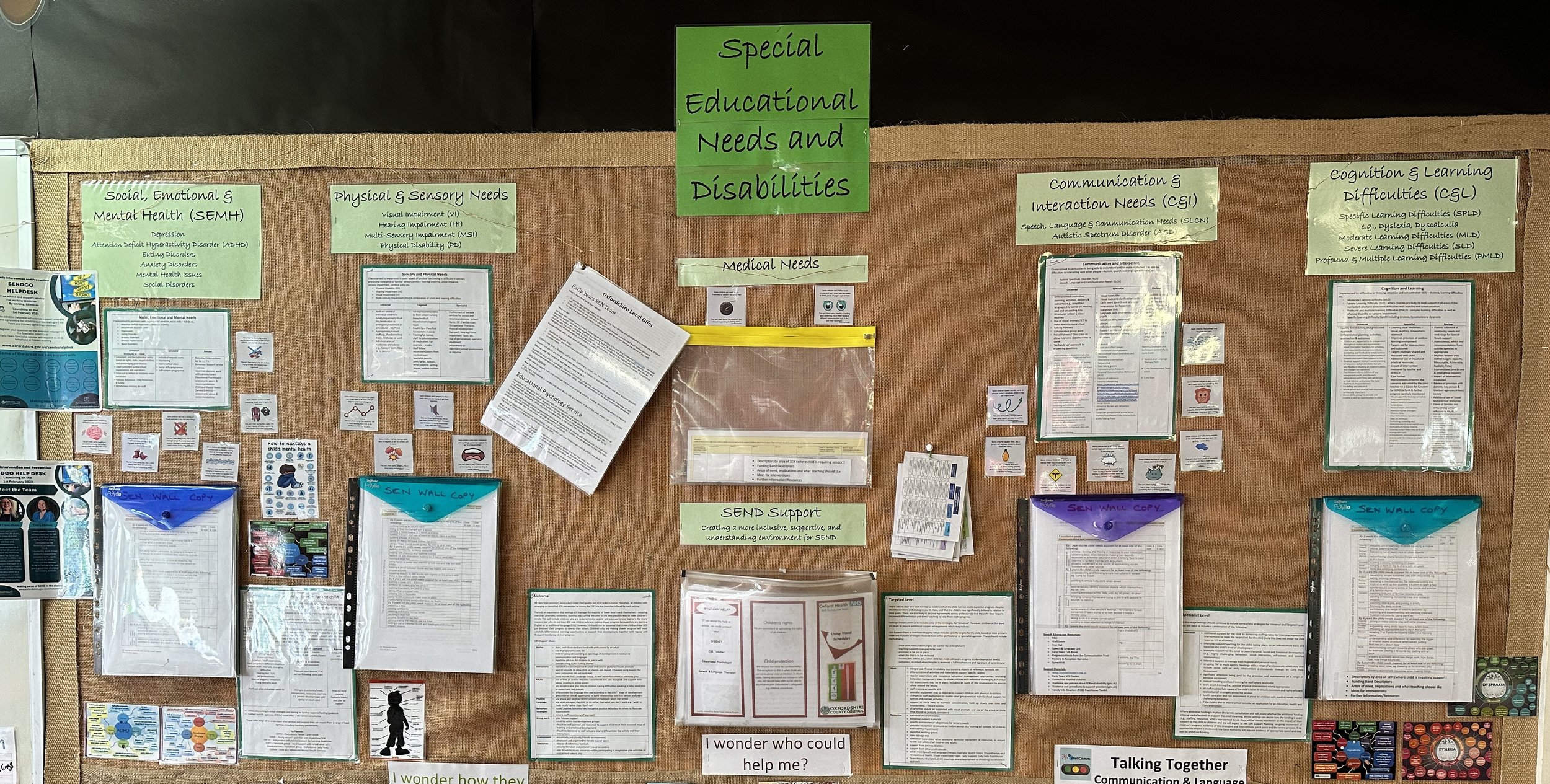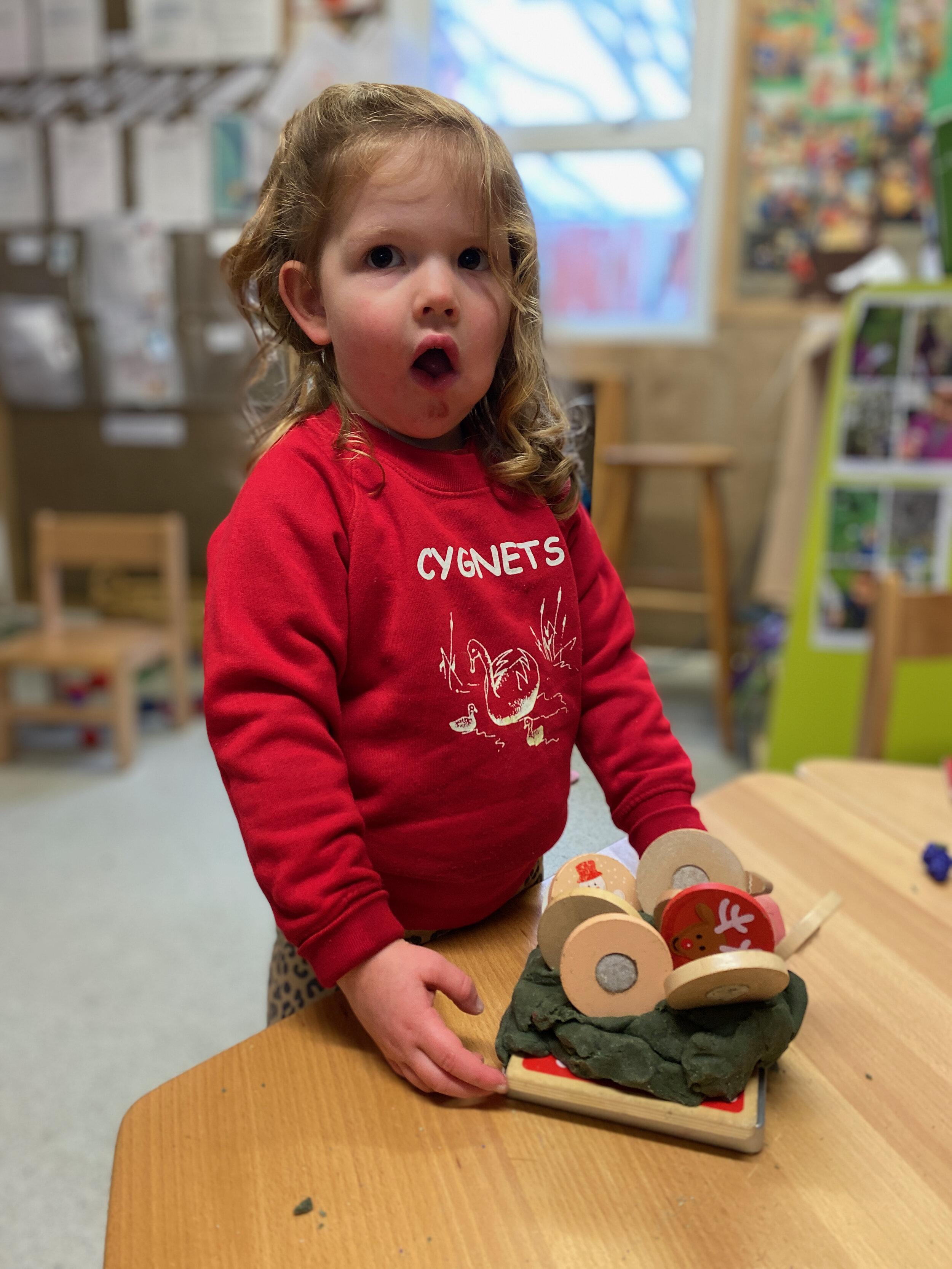SEND
Special Educational Needs and Disabilities
We provide an environment in which all children, including those with special educational needs and disabilities, are supported to reach their full potential:
We comply with the Statutory Framework for the EYFS 2021 and Equality Act 2010
We have regard for the DfE Special Educational Needs and Disability Code of Practice 2015
We ensure our provision is inclusive to all children with special educational needs
We support parents/carers and children with special educational needs and disabilities (SEND)
We identify the specific needs of children with special educational needs and meet those needs through a range of SEN strategies
We work in partnership with parents/carers and other agencies in meeting individual children's needs
We monitor and review our policy, practice and provision and, if necessary, make adjustments
We want every child to access the curriculum, and we focus our efforts to make sure that every child can take part, and can thrive. We aim where possible to ‘scaffold up’ so that children are included in the curriculum and they’re learning alongside their friends rather than ‘differentiate down’ - offering them different or less challenging learning.
Procedures
Our SENDCo Lead is Hayley Durbin, she has a Level 3 qualification in EY SENDCo.
We ensure that the provision for children with special educational needs is the responsibility of all members of the setting
We provide a SEND Local Offer, setting out what we provide for children with SEND which raises awareness of our provision and enables parents/carers to see clearly what services are available for children with SEND at Cygnets Preschool and how to access these services
We ensure that our inclusive admissions practice ensures equality of access and opportunity
We use the graduated approach for identifying, assessing, and responding to children's special educational needs
We have a strong universal, quality first provision for the prime areas including language with skilled and confident staff
We ensure that our physical environment is as far as possible, suitable for children with SEND
We work closely with parents/carers of children with special educational needs to create and maintain a positive partnership
We ensure that parents/carers are informed at all stages of the assessment, planning, provision and review of their children's education
We provide parents/carers with information on sources of independent advice and support
We liaise with other professionals involved with children with special educational needs and their families, including transfer arrangements to other settings and schools
We provide a differentiated curriculum to meet individual needs and abilities
We have systems in place for supporting children with SEN
We provide a complaints procedure
Our Local Offer for Children with Special Educational Needs and Disabilities
The purpose of a local offer is to enable parents/carers to see clearly what services are available for children with SEND in their area and how to access them. The following information forms our local offer and shows how we provide for children with special educational needs and disabilities.
Identifying Children with Special Educational Needs and Disabilities
Prior to induction parents/carers will be given an ’All About Me’ sheet to fill in about their child. This will help us to share information about the child’s strengths and needs.
Every child is treated as a unique individual and each child has a key person. Their role is to develop trusting relationships with parents/carers and children to enable respectful sharing of information and to build positive partnerships. If you have any concerns about your child’s development our door is always open, and this will enable you to discuss your concerns.
Ongoing observational assessments are made for all children and are linked to the Development Matters ages and stages of development. This in some cases identifies individual needs. If your child’s key person has identified a possible individual need, they or the manager will discuss this with you. Parents / carers permission will always be sought to speak to outside agencies.
Reports from health care professionals may identify a child’s individual needs and we will include these in your child’s learning and development.
Supporting Children with SEND
We will work together to support individual needs, listening to you and your child.
Individual targets may be set to support your child’s learning and development. Your child’s key person/the manager will work on and oversee these targets. You may also be given ideas to use at home.
Each child has a Learning Journey, which contains examples of their work, photographs, observations and assessments. The children’s learning styles, interests and stage of development will be recognised and used to promote achievements and development. Activities will be adapted to ensure your child is able to interact fully within our environment, and visual strategies such as a visual timetable can be used to help them understand our routines.
Cygnets Preschool are able to offer support with personal needs such as nappy changing, toileting, eating and resting, if required.
Our environment is accessible to all. We have disabled access via both entrance and exit and a disabled toilet with handrail. Resources are easily accessible by children, who have free choice. We will explore any limitations of the building and would make changes or adapt our facilities where possible.
Early understanding and identification are crucial for children with a special need or disability. Staff, in partnership with parents, children and where needed, outside agencies, monitor, assess, plan and provide the best learning opportunities possible for each individual child.
Children build up trusted relationships with staff and peers and are then encouraged to become independent learners and thinkers. Children with a special need or disability are treated in the same way and staff work hard to ensure that all children are included in every single aspect of life at Cygnets Preschool.
What is a special need?
In England, the government defines special needs as:
A child has special educational needs if they have a learning problem or disability that make it more difficult for them to learn than most children their age. They may have problems with schoolwork, communication or behaviour.
'Special educational needs' is a legal definition and refers to children with learning problems or disabilities that make it harder for them to learn than most children the same age.
There are four main areas of Special Educational Need…
Cognition & Learning Difficulties
Communication & Interaction Needs
Social, Emotional, Mental Health Needs
Physical and/or Sensory Needs
What is the SEND code of practice?
The SEND code of practice is a statutory code containing:
details of legal requirements that you must follow without exception
statutory guidance that you must follow by law unless there’s a good reason not to
It explains the duties of local authorities, health bodies, schools and colleges to provide for those with special educational needs under part 3 of the Children and Families Act 2014.
SEND Help and/or Support
SENCO, CYGNETS PRESCHOOL
A SENCo, or Special Educational Needs Co-ordinator, is the school teacher who is responsible for assessing, planning and monitoring the progress of children with special educational needs and disabilities (SEND).
SNAP
SNAP (Special Needs Action Panel) is a pro-active, independent forum of parent carers who all have children or young people with Special Educational Needs and Disabilities (SEND). SNAP’s purpose is to improve the services provided for our young people, aged between 0 and 25 years.
IPSEA
IPSEA offers free and independent legally based information, advice and support to help get the right education for children and young people with all kinds of special educational needs and disabilities (SEND). We also provide training on the SEND legal framework to parents and carers, professionals and other organisations.
ASD
Autism spectrum disorder (ASD) is a developmental disorder that affects communication and behaviour. Although Autism can be diagnosed at any age, it is said to be a “developmental disorder” because symptoms generally appear in the first two years of life.
Difficulty with communication and interaction with other people
Restricted interests and repetitive behaviours
Autism is known as a “spectrum” disorder because there is wide variation in the type and severity of symptoms people experience. ASD occurs in all ethnic, racial, and economic groups. Although ASD can be a lifelong disorder, treatments and services can improve a person’s symptoms and ability to function.
CAHMS
CAMHS stands for Child and Adolescent Mental Health Service. CAMHS help children and young people up to 18 who are finding it hard to cope with everyday life because of difficult feelings, behaviour or relationships.
Most of the time when we are sad, angry, stressed or worried these feelings pass within a few days, but if they go on for a while and stop us enjoying and coping with life, then CAMHS can help.
Just as we go to the doctors when we are physically ill, sometimes we need extra help with our mental health.
ADHD
Attention deficit hyperactivity disorder is a condition that includes symptoms such as inattentiveness, hyperactivity and impulsiveness.
Symptoms of attention deficit hyperactivity disorder include a short attention span, constantly fidgeting and acting without thinking.
Attention deficit hyperactivity disorder can often be treated with medicines and talking therapies.
It's not clear what causes attention deficit hyperactivity disorder, but it tends to run in families.
SEMH
SEMH needs are a type of special educational need where a child communicates through behaviour in response to unmet social, emotional or mental health needs.
Children with SEMH needs often have difficulties in managing their emotions or their behaviour. They can show inappropriate responses to their emotions. They can feel scared, anxious and misunderstood.
SLCN
Speech, language and communication needs (SLCN) is the term given to describe the extensive range of needs related to all aspects of communication – from understanding others to forming sounds, words and sentences to expressing ideas and emotions and using language socially.
OXFORDSHIRE LOCAL OFFER
The ‘Local Offer’ for SEN and Disability (SEND) brings together information about education, health and care services for children and young people from 0 to 25 with SEND.
Cognition & Learning
Cognition refers to the thinking skills and thought processes that a child has acquired through their prior experience. Learning needs are on a continuum and can vary across subjects and situations. Children with learning needs may learn at a slower pace than their peers despite appropriate differentiation. Learning difficulties can be general or specific and related to one or more areas of the curriculum. Difficulties may be short-term in one or more areas or severe and long term.
Specific learning difficulties (SpLD) affect one or more specific aspects of learning. This encompasses a range of conditions such as dyslexia, dyscalculia and dyspraxia.
SENDIASS
SENDIASS give free, confidential and impartial information relating to your child’s special educational needs. They provide information regarding parents’ rights and responsibilities, and sign post you to who you can talk to about your child.
Physical / Sensory Disabilities
A physical disability is any impairment which limits the physical function of one or more limbs or motor ability, including sensory impairments and impairments which limit other areas of daily living, such as cardiovascular or respiratory disorders. ... Sight and hearing loss are common sensory disabilities.











